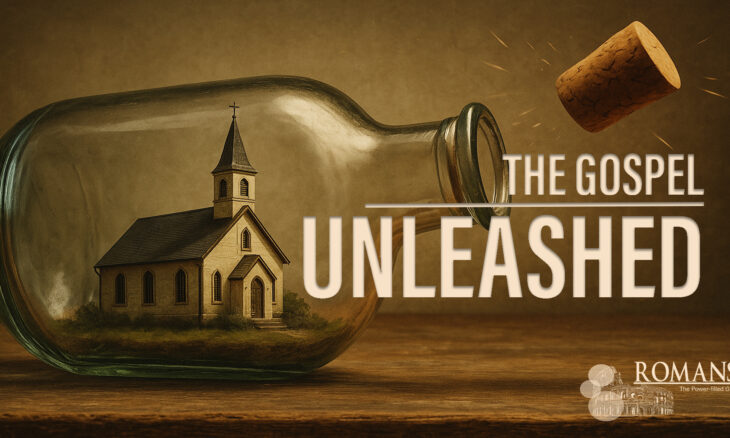Every small town has that one building that seems to hold the community together—a volunteer fire station, a school gym, or maybe a café where everyone knows your name. It’s not the size of the place that matters—it’s the people inside it, the ones who show up when someone’s hurting, who celebrate together and carry each other through hard times.
That’s what the church is meant to be—a place where the love of Christ turns ordinary people into something extraordinary together.
Paul saw that kind of strength in the believers at Rome.
- They weren’t perfect.
- They had disagreements,
- Different cultures,
- Different ways of seeing the world—
- But they shared one Savior.
And in Romans 15, Paul reminds them that the real strength of a church isn’t found in its programs, buildings, or reputation—it’s found in its people, filled with the Spirit, committed to building each other up, keeping Christ at the center, giving generously, and praying boldly.
You could say Romans 15 is Paul’s blueprint for a gospel-shaped church—one that doesn’t just survive in a divided world, but shines in it.
So here’s the question that sets the tone for today:
What kind of church are we becoming?
Are we just a gathering of individuals, or are we a body—working together, lifting one another, and displaying the glory of Christ in everything we do?
Romans begins with Paul saying he’s “not ashamed of the gospel” (1:16).
Here, as he closes, we see how that gospel moves us outward—to serve, to give, to go.
I. A Church That Builds One Another Up
Romans 15:14–16
“You yourselves are full of goodness, filled with all knowledge and able to instruct one another.”
Paul begins by affirming the Roman believers. He doesn’t write to scold or correct, but to strengthen.
- They are already demonstrating spiritual maturity—full of goodness, rich in understanding, and equipped to teach and encourage one another.
- Mature faith is never just about personal growth; it’s about shared growth.
- It’s not only about what God is doing in me, but also what God wants to do through me in the lives of others.
Think of a workout partner. They don’t lift the weights for you, but they make sure you don’t drop them.
- They spot you when the bar feels heavy,
- they challenge you when you get comfortable,
- they celebrate when you set a new record.
- To be honest in some cases it isn’t safe to work out without one.
In the same way, a healthy church is filled with “spiritual spotters”—people who cheer, correct, and support one another as we all grow stronger in Christ.
You might also picture a construction site. Every worker has a different role
- some lay the foundation,
- others frame the walls,
- others wire the lights—
- but they’re all working toward one structure.
The Church is God’s building project, and every believer contributes to its strength
Ephesians 4:11–16
So Christ himself gave the apostles, the prophets, the evangelists, the pastors and teachers, 12 to equip his people for works of service, so that the body of Christ may be built up 13 until we all reach unity in the faith and in the knowledge of the Son of God and become mature, attaining to the whole measure of the fullness of Christ.
14 Then we will no longer be infants, tossed back and forth by the waves, and blown here and there by every wind of teaching and by the cunning and craftiness of people in their deceitful scheming. 15 Instead, speaking the truth in love, we will grow to become in every respect the mature body of him who is the head, that is, Christ. 16 From him the whole body, joined and held together by every supporting ligament, grows and builds itself up in love, as each part does its work.
Who are you “spotting” in the faith right now?
Who are you building up instead of just building around?
- Maybe it’s a younger believer who needs encouragement.
- Maybe it’s a struggling friend who needs truth spoken in love (Ephesians 4:15).
- Maybe it’s a fellow leader who’s carrying too much alone.
We live in a world that’s quick to tear down, criticize, and compare—but a gospel-shaped church does the opposite. It lifts, strengthens, and restores.
Galatians 6:1–2 reminds us to “bear one another’s burdens, and so fulfill the law of Christ.”
A gospel-centered church doesn’t just gather to learn—it gathers to build.
When the people of God use the Word of God to strengthen the people beside them, the whole body becomes healthier, and the mission of Christ advances farther.
II. A Church That Keeps Christ Central
Romans 15:17–21
Therefore I glory in Christ Jesus in my service to God. 18 I will not venture to speak of anything except what Christ has accomplished through me in leading the Gentiles to obey God by what I have said and done— 19 by the power of signs and wonders, through the power of the Spirit of God. So from Jerusalem all the way around to Illyricum, I have fully proclaimed the gospel of Christ. 20 It has always been my ambition to preach the gospel where Christ was not known, so that I would not be building on someone else’s foundation.
Paul’s ministry résumé was impressive
- missionary journeys,
- church plants,
- miracles,
- and suffering for the gospel in numerous ways
Yet when he looked back over all of it, he refused to boast in himself.
- Every success, every soul reached, every victory won was the work of Christ through him.
- Paul’s confidence wasn’t in his ability, but in his Savior.
This is what it means to keep Christ central: to see Him as the source, the motive, and the goal of all ministry.
When Christ is at the center, pride fades and praise rises. The church becomes less about personalities and more about the Person of Jesus.
In sports, the best coaches know how to redirect praise.
- After a big win, reporters rush in with microphones, ready to credit the coach’s strategy or leadership.
- But the wise coach quickly says, “It wasn’t me—it was the team.”
Paul takes that same posture, but with an even greater humility. He says, in essence, “It wasn’t me—it was Christ.”
Or imagine a windowpane in a old church. Its beauty isn’t in the glass itself—it’s in how it lets the light shine through. Our lives and ministries are meant to be like that—transparent to the glory of Christ
2 Corinthians 4:5–7
For what we preach is not ourselves, but Jesus Christ as Lord, and ourselves as your servants for Jesus’ sake. 6 For God, who said, “Let light shine out of darkness,”[a] made his light shine in our hearts to give us the light of the knowledge of God’s glory displayed in the face of Christ.
7 But we have this treasure in jars of clay to show that this all-surpassing power is from God and not from us.
I have a challenging question for all of us this morning! In your ministry, career, or family—whose name are you really lifting up?
- It’s easy to build a personal brand, to seek recognition, or to make sure people notice our contributions.
- But the gospel calls us to a different way: He must increase, but I must decrease (John 3:30).
When people think of your service, do they see your fingerprints, or do they see Christ’s hand?
- In conversation, in working, in leadership—does the spotlight rest on you, or does it move to Him?
Keeping Christ central doesn’t mean we disappear
- It means we point clearly.
- Like John the Baptist,
- We exist to prepare the way for Jesus.
- Like Paul, we count it joy to speak only of what Christ has accomplished through us.
A Christ-centered church doesn’t exist to make a name for itself but to make the name of Jesus known.
When His glory becomes our greatest goal, our words, our ministries, and our lives begin to echo Paul’s confession: “I will not venture to speak of anything except what Christ has accomplished through me.”
III. A Church That Gives Generously
Romans 15:25-27
At present, however, I am going to Jerusalem bringing aid to the saints. 26 For Macedonia and Achaia have been pleased to make some contribution for the poor among the saints at Jerusalem. 27 For they were pleased to do it, and indeed they owe it to them. For if the Gentiles have come to share in their spiritual blessings, they ought also to be of service to them in material blessings.
Paul turns his focus from preaching to practical compassion.
As he prepares to travel to Jerusalem, he carries with him a financial gift collected from Gentile churches.
- What makes this offering remarkable is not just its generosity, but its symbolism—it came from believers in Macedonia and Achaia,
- Gentiles, for the sake of Jewish Christians in need.
- In a world divided by race, class, and geography, generosity became the bridge that united God’s people.
Paul reminds the Romans that giving isn’t merely about meeting needs—it’s about sharing grace. T
he word “contribution” (Greek koinonia) means fellowship or partnership.
When we give, we are joining in God’s mission and linking arms with others in the gospel.
True generosity reflects the heart of Christ, who
2 Corinthians 8:9
For you know the grace of our Lord Jesus Christ, that though he was rich, yet for your sake he became poor, so that you by his poverty might become rich.
Think of how people rally together when tragedy strikes a community.
- When a local athlete is injured, fans start a GoFundMe campaign
- when a fire devastates a family’s home, neighbors show up with meals, clothes, and support.
- Something powerful happens when people give beyond themselves—walls fall, hearts connect, and hope spreads.
That’s the picture Paul paints here. The Gentile churches didn’t know the Jerusalem believers personally, but they saw them as family.
Their generosity wasn’t transactional—it was relational.
Giving became an expression of unity, proving that the gospel creates one body across every boundary.
Generosity isn’t about the size of the gift—it’s about the spirit behind it.
Paul also talks to the Corinthians about the gift of the Macedonia’s
2 Corinthians 8:1–5
We want you to know, brothers, about the grace of God that has been given among the churches of Macedonia, 2 for in a severe test of affliction, their abundance of joy and their extreme poverty have overflowed in a wealth of generosity on their part. 3 For they gave according to their means, as I can testify, and beyond their means, of their own accord, 4 begging us earnestly for the favor[b] of taking part in the relief of the saints— 5 and this, not as we expected, but they gave themselves first to the Lord and then by the will of God to us.
Giving isn’t just a money thing!
- but with time,
- hospitality,
- and attention.
- Maybe it’s noticing someone who always serves but rarely rests—and offering to give them a break.
- Maybe it’s opening your home for a meal, mentoring a younger believer,
- Or investing resources in the church or missions.
A gospel-shaped church gives because God gave first. Our generosity—whether financial, relational, or spiritual—tells the world that Christ has broken down every barrier and made us one.
When we give, we do more than meet needs; we mirror the heart of our generous Savior.
IV. A Church That Prays Boldly
Romans 15:30–33
I appeal to you, brothers, by our Lord Jesus Christ and by the love of the Spirit, to strive together with me in your prayers to God on my behalf, 31 that I may be delivered from the unbelievers in Judea, and that my service for Jerusalem may be acceptable to the saints, 32 so that by God’s will I may come to you with joy and be refreshed in your company. 33 May the God of peace be with you all. Amen.
Paul closes his letter with an earnest request—not for money, not for manpower, but for prayer.
The great apostle who crossed oceans, planted churches, and stood before kings freely admits his dependence on the prayers of God’s people.
- Mission, for Paul, was never just about planning or strategy—it was about partnership in prayer.
That phrase “strive together” comes from the Greek word agonizomai, the root of our word agonize.
- It means to struggle, to wrestle, to labor earnestly.
- Paul invites the church in Rome to join him in that struggle—not on the front lines of his mission field, but on the front lines of intercession.
Picture a quarterback at the line of scrimmage. He surveys the defense, sees something unexpected, and calls an audible.
- In that moment, he needs his team to adjust
- to back him up, to block, to protect, to move in unison.
That’s what Paul is asking the church to do: “Back me up in prayer.” He’s saying, “I can’t do this alone. Stand with me, strive with me, pray with me.”
Or think of soldiers on the battlefield—some on the front lines, others in communication tents far behind, relaying information, coordinating support, and supplying what’s needed.
The mission only succeeds when everyone does their part. Prayer is that unseen support—quiet, but essential.
Are we striving together in prayer?
- For one another, for missions, for boldness in our communities?
- It’s easy for prayer to become an afterthought—something we do after our plans fail instead of before our plans form.
- But what if prayer became our reflex, not our fallback?
What if we prayed boldly for our missionaries, church leaders, and neighbors?
- What if we prayed not just for comfort, but for courage?
- Not just for safety, but for spiritual strength?
The early church changed the world not because they had influence or strategy, but because they strived together in prayer (Acts 4:31; Colossians 4:2–3).
When prayer becomes our instinct, dependence becomes our posture, and God’s power becomes our story.
This was the attitude of the early believers:
Colossians 4:2–3 – “Continue steadfastly in prayer… that God may open to us a door for the word.”
Acts 4:31 – “When they had prayed, the place was shaken… and they were all filled with the Holy Spirit and continued to speak the word of God with boldness.”
James 5:16 – “The prayer of a righteous person has great power as it is working.
Conclusion
One of the greatest blessings we were ever privileged of being a part of was the Churches response to various hurricanes we and others close to us how weathered.
That’s what happens when the church lives out Romans 15.
- When we build one another up, the weak find strength.
- When we keep Christ central, pride gives way to purpose.
- When we give generously, the needs of others become opportunities for grace.
- And when we pray boldly, God moves in ways no plan ever could.
That kind of church becomes unstoppable—not because it’s big or famous—but because it’s faithful.
It’s the kind of church Jesus prayed for in John 17 and the kind of church the world still needs to see today.
Paul’s vision for the church in Romans 15 is the same vision God has for us today—a gospel-shaped church.
- A church that builds one another up, strengthening faith through truth and encouragement.
- A church that keeps Christ central, where all glory belongs to Him alone.
- A church that gives generously, reflecting the grace of the One who gave Himself for us.
- And a church that prays boldly, depending not on programs or personalities, but on the power of God.
When these marks are present, something beautiful happens.
- The church becomes more than an institution—it becomes a living testimony of the gospel.
- The world sees not a crowd of perfect people, but a community transformed by grace, united by truth, and sustained by prayer.
That’s the kind of church the world needs—and the kind of church we are called to be.















